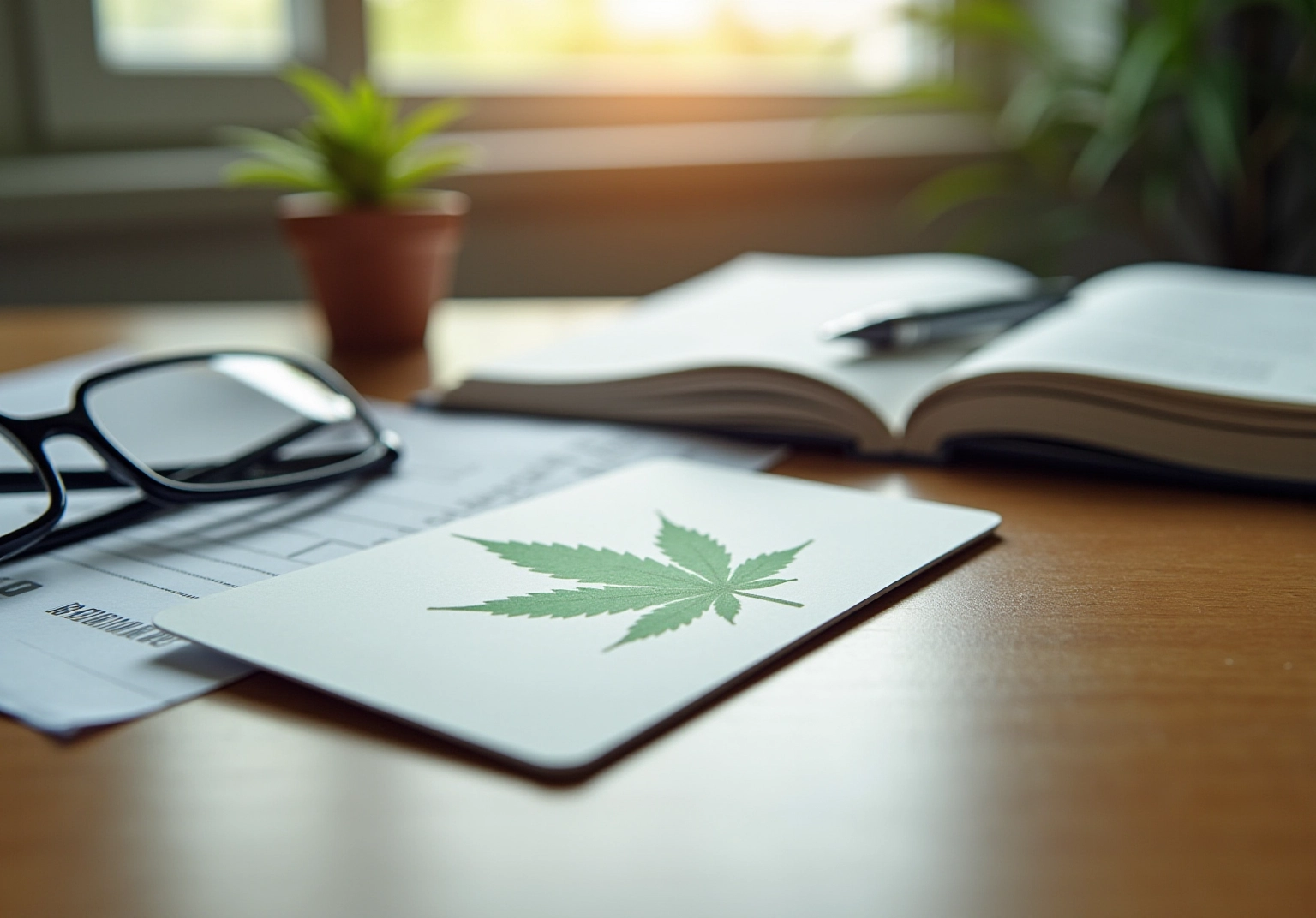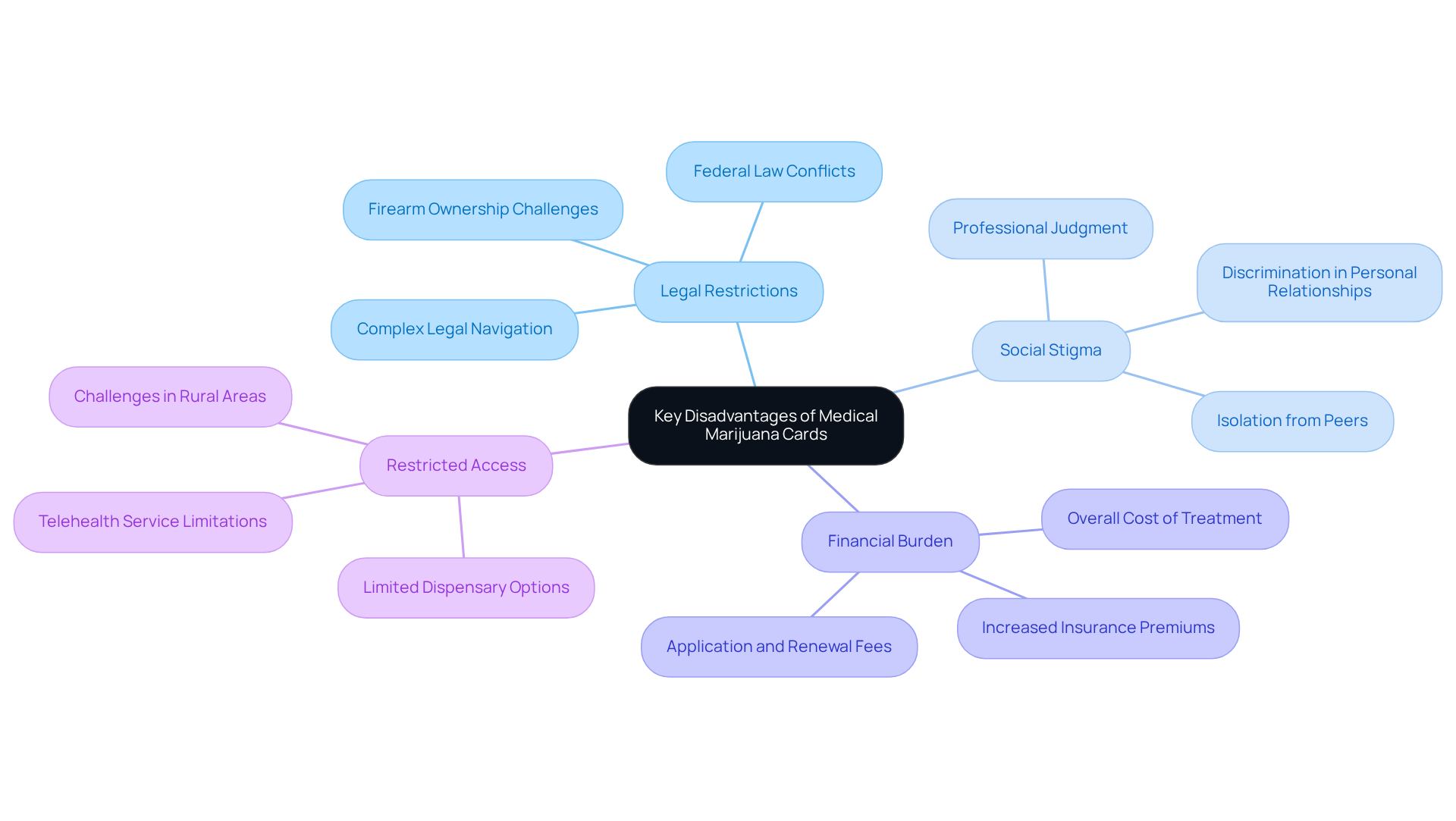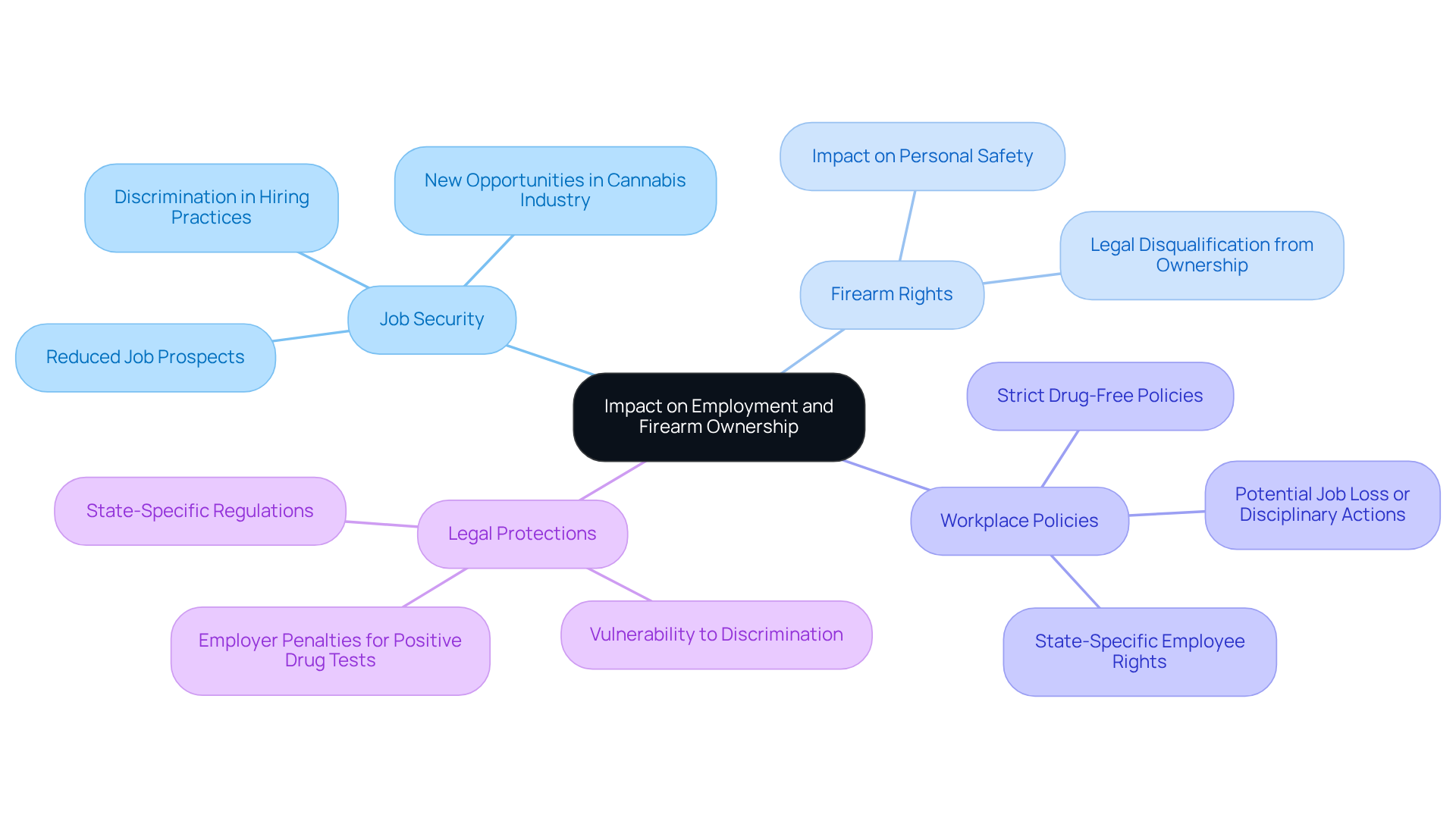4 Key Downsides to Getting a Medical Card You Should Know
by Maya Green · June 21, 2025
Explore the key downsides to getting a medical card, including legal, financial, and social challenges.

Overview
It’s important to recognize that obtaining a medical marijuana card can come with certain challenges. Many individuals face:
- Legal restrictions on firearm ownership
- Social stigma
- Significant financial burdens
These challenges can weigh heavily on their minds. Additionally, access to dispensaries may be limited, creating further obstacles for those seeking relief.
These factors can profoundly affect cardholders’ rights and social interactions, leading to feelings of isolation or frustration. It’s essential to understand how these complexities might impact your financial stability and overall quality of life. Navigating these hurdles may feel daunting, but you’re not alone in this journey.
While the therapeutic benefits of medical marijuana can be significant, acknowledging these potential drawbacks is crucial. Remember, it’s okay to seek support and gather information to make informed decisions that align with your needs.
If you find yourself grappling with these issues, consider reaching out to community resources or support groups that can provide guidance and understanding. Your well-being is important, and taking proactive steps can help you navigate the path ahead with greater confidence.
Introduction
Navigating the world of medical marijuana can feel overwhelming, especially for those contemplating the process of obtaining a medical card. Many patients are on a journey to find relief through cannabis, yet it’s essential to recognize that several key downsides can add complexity to this decision.
- Legal restrictions, such as those affecting firearm ownership,
- The financial burden of application and renewal costs
are significant factors that potential cardholders must carefully consider in light of their health needs.
It’s important to remember that balancing the therapeutic benefits of cannabis with societal and legal hurdles is a deeply personal journey. How can you navigate these challenges while prioritizing your well-being? Reflecting on your needs and circumstances can help you find a path that feels right for you.
Identify Key Disadvantages of Medical Marijuana Cards
- Legal Restrictions: For many medical cannabis cardholders, significant legal limitations can create challenges, especially regarding firearm ownership. In numerous states, having a cannabis prescription may prevent individuals from purchasing firearms, as federal law prohibits the sale of firearms to anyone deemed an unlawful user of a controlled substance. This situation can be particularly difficult for those who rely on marijuana for therapeutic purposes while also wanting to exercise their rights to possess firearms. It’s important to remember that navigating these legal complexities can feel overwhelming.
- Social Stigma: Despite the growing acceptance of cannabis, individuals may still encounter social stigma or discrimination due to their marijuana use. This stigma can impact both personal and professional relationships, leading to feelings of isolation or judgment from peers and employers. Prominent figures, like Morgan Freeman, have emphasized the importance of recognizing the therapeutic benefits of cannabis, yet societal perceptions can still pose challenges for those trying to balance their health needs with everyday life. Leafy DOC’s compassionate telehealth services have been transformative for many, offering a supportive environment where individuals feel validated and respected.
- One of the downsides to getting a medical card is the significant financial burden of obtaining and maintaining it. Patients must consider various expenses, including application fees, renewal costs, and potential increases in insurance premiums. In 2020, nearly 3 million therapeutic herb users were registered in the U.S., underscoring the rising demand for these services. These costs can add up, especially for those already facing financial challenges due to health issues, highlighting the downsides to getting a medical card. However, many individuals have shared that the relief provided by therapeutic marijuana often outweighs these expenses, making it a valuable investment in their well-being.
- Restricted Access: Access to dispensaries varies widely by state, with some areas offering limited options for obtaining cannabis for therapeutic use. Patients in rural locations or those without nearby dispensaries may struggle to access their medication conveniently, which can hinder their treatment plans and overall quality of life. Leafy DOC has made significant progress in addressing this issue by providing effective telehealth services that connect individuals with knowledgeable doctors from the comfort of their homes, ensuring that even those in remote areas can receive the support they need.
Examine Legal Restrictions and Implications
- Firearm Ownership: It’s important to recognize that under federal law, individuals with a cannabis use card face significant barriers when it comes to buying or holding firearms. This limitation can create substantial challenges for many patients who rely on marijuana for pain relief or other health issues. Additionally, the legal landscape becomes more complex as THC can remain detectable in the body for weeks, potentially leading to legal complications for cardholders who own firearms. Many veterans utilizing cannabis report experiencing fewer PTSD symptoms and a reduced need for prescription medications, highlighting the vital role cannabis plays in their treatment plans despite these legal hurdles.
- Employment Restrictions: For medical cannabis cardholders, navigating employment can be daunting, especially in federal positions or industries with strict drug policies. Many employers may choose not to hire or could terminate employees known to possess a marijuana card, highlighting the downsides to getting a medical card in terms of job security. It’s alarming to note that a significant number of employers still enforce zero-tolerance policies regarding drug use, which illustrates the downsides to getting a medical card for individuals using marijuana for legitimate health reasons. This is particularly concerning for patients, including those battling cancer, who report an improved quality of life through therapeutic marijuana, as they may face bias in the workplace.
- Interstate Travel: Traveling with a cannabis prescription can lead to numerous complications due to the differing laws across states. While some states have embraced the legalization of medical marijuana, others maintain strict prohibitions, making it illegal to possess the substance even with a valid card. This inconsistency can expose individuals to legal risks when crossing state lines, as they may unknowingly violate laws in areas where marijuana remains illegal. For instance, those suffering from chronic pain who rely on marijuana for relief may find themselves in precarious situations when traversing state borders.
- Public Perception: The evolving legal status of marijuana continues to shape public perception, often resulting in misunderstandings and biases against cannabis cardholders. This stigma can affect social interactions and community standing, as individuals may encounter judgment or discrimination due to their use of marijuana, even when it is essential for their health. However, with 91% of Americans supporting the legalization of medicinal marijuana, there is hope for a shift in attitudes towards those who use it for health benefits. As more patients, including those with multiple sclerosis, share their positive experiences with therapeutic marijuana, the conversation surrounding its use is gradually changing.
Assess Impact on Employment and Firearm Ownership
-
Job Security: If you’re a medical cannabis cardholder, you may have faced discrimination in hiring practices, especially in industries that require drug testing. It’s disheartening to know that research indicates the downsides to getting a medical card include individuals with therapeutic use permits often encountering reduced job prospects because some employers hesitate to hire applicants who use cannabis, even for legitimate health reasons. This can create significant hurdles in finding stable employment, particularly in sectors with strict drug policies. However, it’s worth noting that the growth of the cannabis industry is opening up new job opportunities, especially for those knowledgeable about organic farming and the regulations surrounding medicinal cannabis, such as the Colorado Marijuana Med Badge.
-
Firearm Rights: The legal landscape concerning firearm ownership for medicinal cannabis users is complex and can be concerning. In many states, holding a therapeutic cannabis card may disqualify you from legally owning firearms, which raises important questions for patients who value self-defense. This restriction can be particularly challenging for those in professions where personal safety is critical, as it emphasizes the downsides to getting a medical card and forces difficult choices between managing health and exercising firearm rights.
-
Workplace Policies: Many employers uphold strict drug-free workplace policies, which can lead to job loss or disciplinary actions against employees who use cannabis, even if it’s during their personal time. This creates a precarious situation for cardholders, illustrating the downsides to getting a medical card, as they might face termination or penalties despite their legal right to use cannabis for therapeutic purposes. It’s essential to understand these policies as you navigate your employment rights. Currently, 14 states offer some form of employee rights for therapeutic cannabis, reflecting the diverse protections available across different regions.
-
Legal Protections: Understanding state-specific regulations regarding employment protections is vital for patients using cannabis. While some states offer legal safeguards against discrimination for cannabis users, others do not, illustrating the downsides to getting a medical card and leaving individuals vulnerable to unfair treatment in the workplace. Additionally, some states allow employers to penalize or terminate employees for positive drug tests, regardless of cannabis laws, highlighting the potential risks faced by users. Staying informed about these legal protections empowers you to safeguard your employment and advocate for your rights effectively. Furthermore, familiarizing yourself with the latest cannabis regulations in Pennsylvania is crucial for navigating these challenges.
Understand Ongoing Costs and Renewal Requirements
- Application Fees: Navigating the initial application fees for medicinal cannabis cards can be overwhelming, as they often vary significantly by state. These fees typically range from $50 to several hundred dollars. For instance, in Florida, the evaluation fee can be between $150 and $250, plus a non-refundable state registration charge of $75. It’s important to remember that the downsides to getting a medical card can lead to costs that add up quickly, which may cause concern for many patients.
- Renewal Costs: Most states require yearly renewals for cannabis cards, which can involve additional charges similar to the original application expenses. In Washington, for example, renewal fees can be as low as $1 to $10, while in Florida, patients face the same registration fee of $75 each year. You may find that these recurring costs weigh heavily on your budget, making it essential to plan ahead.
- Consultation Fees: Patients often need to cover consultation costs with healthcare professionals to obtain or renew their therapeutic cannabis cards. These fees can range from $100 to $400, depending on the provider and state regulations. This financial burden can be substantial, exacerbating the stress associated with the downsides to getting a medical card. It’s understandable to feel concerned about how these expenses impact your overall well-being.
- Insurance Implications: Many individuals discover that their health insurance policies do not cover the expenses associated with acquiring or renewing a marijuana card. This lack of coverage can lead to significant out-of-pocket costs, complicating access to necessary medical cannabis treatments, which are some of the downsides to getting a medical card. As a result, patients are encouraged to explore local dispensaries for potential discounts or assistance programs that may help alleviate some of these financial burdens. Remember, you are not alone in facing these challenges, and there are resources available to support you.
Conclusion
Navigating the landscape of medical marijuana cards can be challenging, and it’s essential to consider the significant drawbacks that may affect potential users. While these cards can provide vital access to therapeutic cannabis, they also come with various challenges, such as:
- Legal restrictions
- Social stigma
- Financial burdens
- Access limitations
Understanding these downsides is crucial for anyone contemplating the use of medical marijuana for health reasons.
It’s important to remember the four primary disadvantages highlighted:
- The legal implications surrounding firearm ownership
- The social stigma that can impact personal and professional relationships
- The ongoing financial costs associated with obtaining and maintaining a medical card
- The restricted access to dispensaries
Each of these factors can create obstacles that complicate the experience of using medical cannabis. Awareness and preparedness are key for users navigating this journey.
As we recognize the complexities surrounding medical marijuana cards, we empower ourselves to make informed decisions. As societal attitudes continue to evolve, and as more individuals share their experiences, advocating for fair treatment and understanding becomes increasingly vital. You may find that weighing the benefits against these challenges helps ensure you are fully equipped to navigate the potential hurdles in your pursuit of health and well-being. Together, let’s foster a compassionate dialogue around this important topic.
Frequently Asked Questions
What are the legal restrictions associated with medical marijuana cards?
Medical cannabis cardholders may face significant legal limitations, particularly regarding firearm ownership. Federal law prohibits the sale of firearms to individuals deemed unlawful users of a controlled substance, which can complicate the rights of those who use marijuana for therapeutic purposes.
How can social stigma affect medical marijuana cardholders?
Despite growing acceptance of cannabis, individuals may encounter social stigma or discrimination due to their marijuana use. This stigma can impact personal and professional relationships, leading to feelings of isolation or judgment from peers and employers.
What financial burdens are associated with obtaining a medical marijuana card?
Obtaining and maintaining a medical marijuana card can be financially burdensome. Patients must consider application fees, renewal costs, and potential increases in insurance premiums, which can add up, especially for those already facing financial challenges due to health issues.
How does access to dispensaries vary for medical marijuana patients?
Access to dispensaries varies widely by state, with some areas offering limited options for obtaining cannabis for therapeutic use. Patients in rural locations or without nearby dispensaries may struggle to access their medication conveniently, which can hinder their treatment and overall quality of life.
What solutions are available for individuals facing access issues to medical marijuana?
Leafy DOC provides telehealth services that connect individuals with knowledgeable doctors from the comfort of their homes, helping to ensure that even those in remote areas can receive the support and access they need for their medical marijuana needs.
Last Updated: July 12, 2025
Get Approved for Your Medical Marijuana Card in Minutes!

Get Your Medical Card
Connect with a licensed physician online in minutes

Like This Article?
Share with your friends
Table of Contents
Keep Reading
-
Exploring The Role Of Cannabis In Holistic Healing
Uncover the transformative potential of cannabis in holistic healing practices. Learn how this natural remedy can enhance your well-being and explore its role in alternative medicine. Click now to delve into the world of cannabis and holistic healing!
-
The Future of Medicinal Use: Insights into 2025 Cannabis Policy Reform Legislation
Discover how the 2025 cannabis policy reform legislation is reshaping medical marijuana access across the U.S. Learn about key legal changes, cannabis legalization benefits, economic impacts, and future reforms aimed at improving patient access and public health policies.
-
How to Recover from Edibles
If you’ve overdone it on the edibles, don’t worry. We’ve got you covered with tips on how to recover quickly and get back to enjoying your high.





